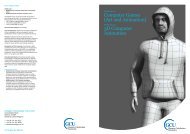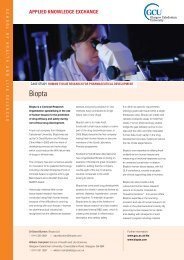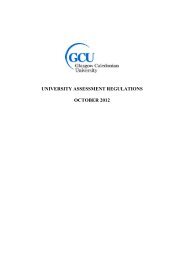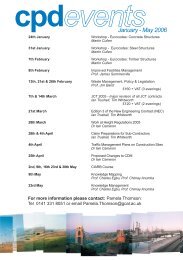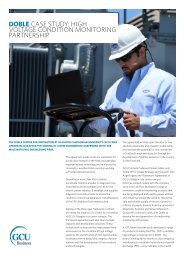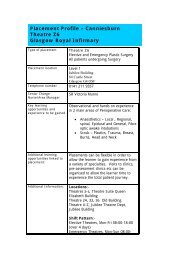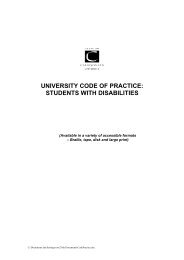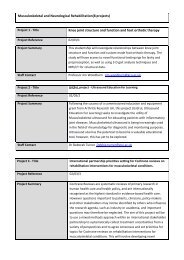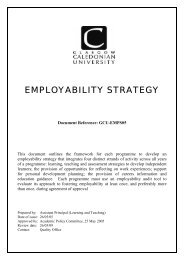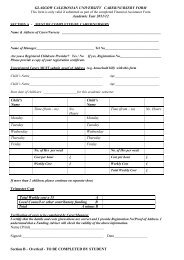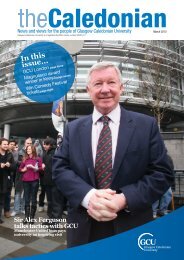Postgraduate - Glasgow Caledonian University
Postgraduate - Glasgow Caledonian University
Postgraduate - Glasgow Caledonian University
You also want an ePaper? Increase the reach of your titles
YUMPU automatically turns print PDFs into web optimized ePapers that Google loves.
MSc/PgD Actuarial Science<br />
67<br />
Contact: Admissions & Marketing Co-ordinator<br />
E: seccourses@gcal.ac.uk<br />
T: +44(0)141 331 3277<br />
W: www.caledonian.ac.uk/sec<br />
Mode of Study & Duration:<br />
PgD Full-time: 32 weeks<br />
MSc Full-time: 48 weeks<br />
MSc Part-time: Three years<br />
Number of Places:<br />
Full-time: 20<br />
Part-time: 10<br />
UK/EU Fees & Funding:<br />
Part funding of PgD awards may be available<br />
from SAAS for eligible full-time candidates.<br />
The period developing the MSc project is not<br />
funded. 2008/09 fees are approximately<br />
£6,300 plus Dissertation fee<br />
Application:<br />
Download a form from our website on<br />
www.caledonian.ac.uk/postgrad<br />
For further information, see page 124 or use<br />
the paper form at the back of this prospectus<br />
Assessment:<br />
All modules include examinations.<br />
Some may also include coursework<br />
This programme mirrors the core technical stage of professional actuarial education provided<br />
by the Faculty and Institute of Actuaries in the UK. This corresponds to the first layer of the UK<br />
actuarial education system and will provide students with a thorough grounding in the key<br />
subject techniques that are the foundations of actuarial work. It will provide successful<br />
graduates with the opportunity to ‘fast track’ their way to the professional qualification.<br />
The university actuarial examinations cover the same syllabus as the professional modules of the Faculty<br />
and the Institute of Actuaries.<br />
Actuarial Science is a distinct blend of mathematics, statistics, finance, economics and other business<br />
oriented subjects. This integrated approach provides a full understanding of financial risk and uncertainty,<br />
its place in the economic fabric, its management and how such can be modelled mathematically.<br />
Risk assessment is particularly appropriate in insurance and pensions where individuals invest money on the<br />
promise of future benefits. It is an actuary who is charged with making financial sense of the future to<br />
predict future benefits and the likely variation in them. In the current climate of financial uncertainty and<br />
given the real-life effect of financial investments, the role of an actuary is gaining even greater importance.<br />
The programme will build on the mathematical knowledge typical of a Mathematics Honours graduate.<br />
It will develop the necessary techniques in a contextual manner to provide conceptualisation and practical<br />
illustration of the material. Additional input from working actuaries will be integral to the programme to help<br />
underpin the academic material. The MSc programme requires the student to research and prepare an<br />
individual project of a substantial nature.<br />
The programme’s entry requirements are an Honours degree or advanced qualification in Mathematics<br />
or Mathematical Statistics or cognate discipline from a British university or recognised overseas institution or<br />
financial experience in an actuarial environment and an Honours degree. For mature candidates, equivalence<br />
to an Honours degree may be demonstrated through the university’s procedures for the Recognition of Prior<br />
Informal Learning (RPL).<br />
Programme Structure:<br />
Semester A: Financial Mathematics;<br />
Foundation Economics for Actuaries;<br />
Probability & Mathematics Statistics<br />
Semester B: Contingencies; Mathematical<br />
Finance; Statistical Methods<br />
International Students:<br />
International students whose first language<br />
is not English shall be required to<br />
demonstrate evidence of satisfactory<br />
competence by completing an IELTS test<br />
with a score of at least 6.0 (with no single<br />
element below 5.5) or by holding another<br />
recognised qualification. See page 12 for<br />
details<br />
Overseas Fees:<br />
£11,000 (2009 fees)<br />
Scholarships:<br />
Partial scholarships are available and<br />
applicants will be advised of these<br />
arrangements upon receipt of an offer



